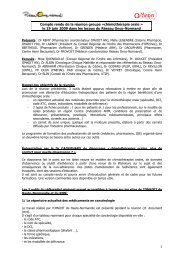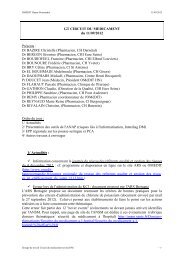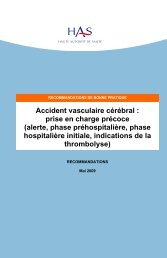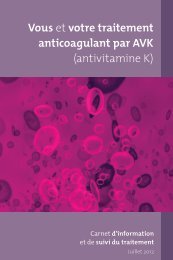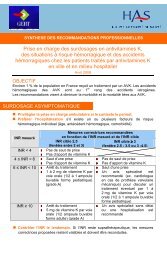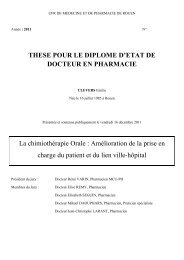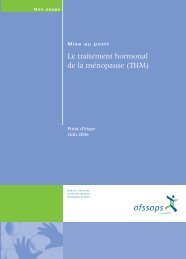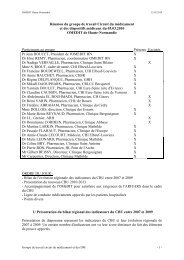RBU du Rituximab - OMéDIT de Haute-Normandie
RBU du Rituximab - OMéDIT de Haute-Normandie
RBU du Rituximab - OMéDIT de Haute-Normandie
You also want an ePaper? Increase the reach of your titles
YUMPU automatically turns print PDFs into web optimized ePapers that Google loves.
other autoimmune diseases. <strong>Rituximab</strong> was prescribed for lymphoma in two patients with RA and two with pSS.<br />
In the 39 other cases, rituximab was given because of the refractory character of the autoimmune disease. The<br />
mean follow up period was 8.3 months (range 2 to 26). There were 11 adverse events in 10 patients and<br />
treatment had to be discontinued in six. Efficacy was observed in 30 patients (70%): RA 11, SLE 9, pSS 5,<br />
vasculitis 2, antisynthetase syndromes 2, sarcoidosis 1. The mean <strong>de</strong>crease in corticosteroid intake was 9.5 mg/d<br />
(range 0 to 50) in respon<strong>de</strong>rs. Seven patients experienced relapse after mean 8.1 months (5 to 15). Three<br />
patients died because of refractory autoimmune disease. CONCLUSIONS: Despite absence of marketing<br />
authorisation, rituximab is used to treat various refractory autoimmune diseases in daily rheumatological practice.<br />
This study showed good tolerance and short term clinical efficacy, with marked corticosteroid re<strong>du</strong>ction in patients<br />
with SLE, pSS, vasculitis, and polymyositis.<br />
Stasi R, Stipa E, Poeta GD, Amadori S, Newland AC, Provan D. Long-term observation of patients with antineutrophil<br />
cytoplasmic antibody-associated vasculitis treated with rituximab. Rheumatology (Oxford). 2006 Apr<br />
21.<br />
OBJECTIVE: <strong>Rituximab</strong>, a chimeric anti-CD20 monoclonal antibody, has been shown to be quite effective in the<br />
treatment of immune disor<strong>de</strong>rs resulting from autoantibodies. We prospectively studied the long-term effects of<br />
rituximab in 10 patients with anti-neutrophil cytoplasmic antibody (ANCA)-positive vasculitis refractory to<br />
conventional therapy (n=3) or in second or subsequent relapse (n=7). METHODS: The median age of patients<br />
was 53 yrs (range 38-70 yrs). Eight were classified as Wegener's granulomatosis, and two as microscopic<br />
polyangiitis. Clinical activity was assessed using the Birmingham Vasculitis Activity Score modification for<br />
Wegener's granulomatosis. Treatment consisted of intravenous infusions of rituximab given at the dose of 375<br />
mg/m(2) weekly for four consecutive weeks. RESULTS: All patients experienced a rapid clinical improvement<br />
following the administration of rituximab, with nine complete responses and one partial response at 6 months.<br />
With a median follow-up of 33.5 months (range 26-45 months), three patients have thus far relapsed. Retreatment<br />
with the monoclonal antibody at the same dose and sche<strong>du</strong>le resulted in a new sustained response in all these<br />
patients. <strong>Rituximab</strong> therapy resulted in prolonged B-cell <strong>de</strong>pletion. The ANCA titres <strong>de</strong>creased significantly in all<br />
patients, with eight out of 10 becoming ANCA-negative and three remaining ANCA-negative even after B-cell<br />
recovery. Infusion-related si<strong>de</strong> effects were observed in one patient, but were of mild intensity and did not require<br />
discontinuation of treatment. CONCLUSIONS: <strong>Rituximab</strong> is an effective and well-tolerated treatment for patients<br />
with ANCA-associated vasculitis and should be strongly consi<strong>de</strong>red in severely affected patients who do not<br />
respond to standard therapy or in those in whom cytotoxic therapy bears a high risk of morbidity.<br />
Brihaye B, Aouba A, Pagnoux C, Cohen P, Lacassin F, Guillevin L. Adjunction of rituximab to steroids and<br />
immunosuppressants for refractory/relapsing Wegener's granulomatosis: a study on 8 patients. Clin Exp Rheumatol<br />
2007; 25:S23-7.<br />
OBJECTIVE: <strong>Rituximab</strong>, an anti-CD20 biotherapy, has been effective against refractory and/or relapsing<br />
Wegener’s granulomatosis (WG). But the frequency of and time to responses to rituximab, and its effects on<br />
various clinical WG manifestations remain to be thoroughly evaluated. METHOD: Retrospective study of 8<br />
patients with refractory/relapsing WG. In addition to their ongoing therapy, 7 patients received rituximab (375<br />
mg/m2 weekly for 4 weeks) and another received 2 rituximab infusions (1 g on days 1 and 15). Disease activity<br />
was assessed using BVAS 2003 before and 6 months after the first rituximab infusion. RESULTS: The median<br />
BVAS before rituximab was 14.3 (range 4–30). At 6 months, 5/8 patients had BVAS=0; 3/8 were in complete<br />
remission; 3/8 in partial remission (lung no<strong>du</strong>les persisted in 2 patients, scored 0 in BVAS); 2/8 did not respond.<br />
One patient relapsed 1 year after stopping rituximab and respon<strong>de</strong>d successfully to a second cycle. Dissociated<br />
responses of constitutional and ‘vasculitis’ symptoms, as opposed to granulomatous manifestations, were<br />
observed: the former regressed within days or weeks, while the latter regressed more slowly, over several<br />
months. Tolerance was good for 7 patients but 1 <strong>de</strong>veloped an urticarial rash <strong>du</strong>ring the last 3 infusions.<br />
Corticosteroids could be tapered in all patients. CONCLUSION: <strong>Rituximab</strong>, when prescribed in conjunction with<br />
corticosteroids and immunosuuppressants to treat refractory/relapsing WG, was able to improve clinical outcome.<br />
But the dissociation of response times in patients with predominantly granulomatous manifestations, as opposed<br />
to vasculitis symptoms, merits further study before an optimal rituximab regimen can be <strong>de</strong>fined.<br />
- 28 -



